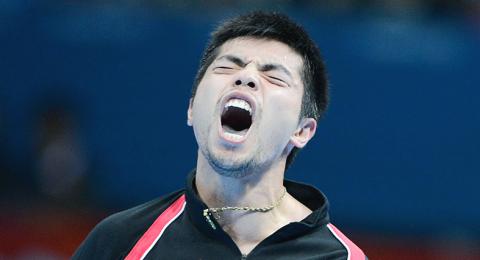Taiwanese table tennis player Chuang Chih-yuan (莊智淵) made history on Tuesday when he defeated good friend Adrian Crisan of Romania to advance to the semi-finals of the men’s singles at the Olympic Games in London.
Chuang, seeded fifth in the tournament, whipped the 15th-seeded Crisan in straight sets, 11-3, 11-4, 11-4, 11-5, to become the first male Taiwanese player ever to advance to the semi-finals at the Olympics.
China-born Chen Jing (陳靜) won a silver medal representing Taiwan in the women’s singles in Atlanta in 1996, but no Taiwanese male has ever made it past an Olympic quarter-final.

Photo: EPA
Chuang reached the quarter-finals in the men’s singles at the Athens Games in 2004 before falling to Wang Hao (王皓) of China in six sets, and it is second seed Wang who Chuang must face again in the semi-final at 6pm today.
“I’m very happy, but the tournament isn’t over,” said the 31-year-old Chuang, reflecting a maturity that may have been missing in the past. “I used to be a lot more temperamental. Now I’m more poised, and I’m able to stay calm and constantly think about strategy, and deal with challenges.”
Tuesday’s match presented a special challenge for Chuang because of his friendship with Crisan, developed when they trained together in Germany.
When Chuang first arrived in Germany, it was Crisan who helped him get acclimatized to the new environment, and the two ate and practiced together.
Calling Crisan “one of my three best friends,” Chuang said the toughest part of the match was getting mentally prepared, both because he was playing a friend, and an opponent who knew the ins and outs of his game.
“After thinking about it, I just decided to play my normal game and yell out to psych myself up as I usually do,” Chuang said.
After a match in which there was little drama, Crisan made it a point to separate sport and friendship.
“We are good friends and that hasn’t changed,” Crisan said after the match as he wished Chuang luck in fulfilling his dream of winning an Olympic medal.
Medaling was not on Chuang’s mind after his win. He was focused on getting some rest and preparing for his semi-final against China’s Wang.
“Every match in the Olympics is a tough battle. The tournament isn’t over,” Chuang said. “I’ll continue to give it everything I have.”
In the other semi-final, which takes place at 5pm today, Chinese No. 1 seed Zhang Jike (張繼科) faces Germany’s Dimitrij Ovtcharov.

The US government has signed defense cooperation agreements with Japan and the Philippines to boost the deterrence capabilities of countries in the first island chain, a report by the National Security Bureau (NSB) showed. The main countries on the first island chain include the two nations and Taiwan. The bureau is to present the report at a meeting of the legislature’s Foreign Affairs and National Defense Committee tomorrow. The US military has deployed Typhon missile systems to Japan’s Yamaguchi Prefecture and Zambales province in the Philippines during their joint military exercises. It has also installed NMESIS anti-ship systems in Japan’s Okinawa

‘WIN-WIN’: The Philippines, and central and eastern European countries are important potential drone cooperation partners, Minister of Foreign Affairs Lin Chia-lung said Minister of Foreign Affairs Lin Chia-lung (林佳龍) in an interview published yesterday confirmed that there are joint ventures between Taiwan and Poland in the drone industry. Lin made the remark in an exclusive interview with the Chinese-language Liberty Times (the Taipei Times’ sister paper). The government-backed Taiwan Excellence Drone International Business Opportunities Alliance and the Polish Chamber of Unmanned Systems on Wednesday last week signed a memorandum of understanding in Poland to develop a “non-China” supply chain for drones and work together on key technologies. Asked if Taiwan prioritized Poland among central and eastern European countries in drone collaboration, Lin

TRAGEDY STRIKES TAIPEI: The suspect died after falling off a building after he threw smoke grenades into Taipei Main Station and went on a killing spree in Zhongshan A 27-year-old suspect allegedly threw smoke grenades in Taipei Main Station and then proceeded to Zhongshan MRT Station in a random killing spree that resulted in the death of the suspect and two other civilians, and seven injured, including one in critical condition, as of press time last night. The suspect, identified as a man surnamed Chang Wen (張文), allegedly began the attack at Taipei Main Station, the Taipei Fire Department said, adding that it received a report at 5:24pm that smoke grenades had been thrown in the station. One man in his 50s was rushed to hospital after a cardiac arrest

ON ALERT: Taiwan’s partners would issue warnings if China attempted to use Interpol to target Taiwanese, and the global body has mechanisms to prevent it, an official said China has stationed two to four people specializing in Taiwan affairs at its embassies in several democratic countries to monitor and harass Taiwanese, actions that the host nations would not tolerate, National Security Bureau (NSB) Director-General Tsai Ming-yen (蔡明彥) said yesterday. Tsai made the comments at a meeting of the legislature’s Foreign Affairs and National Defense Committee, which asked him and Minister of National Defense Wellington Koo (顧立雄) to report on potential conflicts in the Taiwan Strait and military preparedness. Democratic Progressive Party (DPP) Legislator Michelle Lin (林楚茵) expressed concern that Beijing has posted personnel from China’s Taiwan Affairs Office to its